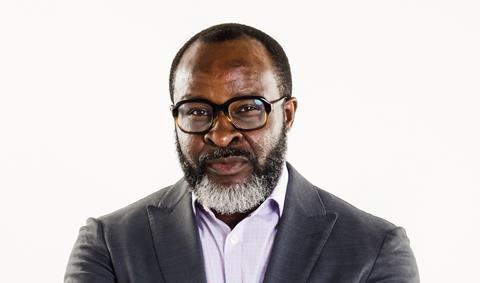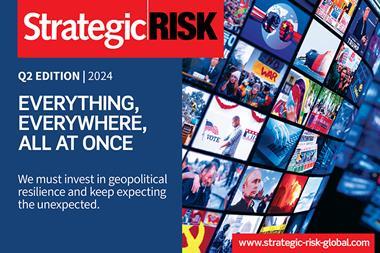Chizubel Egwudo, founder and CEO of risk consultancy, The Risk of You, discusses how businesses can leverage risk to maximise their potential for growth and success.
Global economies have faced multiple disruptions in recent years, from the COVID-19 pandemic and record inflation to supply chain interruptions and a rise in geopolitical tensions.
This has left them struggling to stay afloat and, as a result, many firms have shifted how they view the risk landscape.

StrategicRisk caught up with Chizubel Egwudo, founder and CEO of risk consultancy, The Risk of You, to find out where firms are going wrong and how they can capitalise on better risk management to achieve their goals.
‘Risk management’ is a common term but is often considered a tick-box exercise for the prevention of revenue loss. Having been a risk strategist for over 20 years, do you consider this an accurate perception? And if not, why?
Chizubel Egwudo: No, I don’t consider it an accurate perception at all. Firstly, risk management is one half of risk. The other half of is risk exploitation, and it is more important than risk management.
Risk exploitation is about growth, while risk management is about prevention of loss.
The purpose of risk as an entity, which encompasses both risk exploitation and risk management operated dynamically, is to achieve your purpose as a business and this translates into making more money, profitability, sustainability and all the good benefits you can think of.
Unfortunately, many in the financial sector don’t know this about risk and that is why we continue to see losses such as the famous Silicon Valley Bank and others that have gone bust since 2022.
The collapse of Signature Bank was one that really stood out to me because it was the only bank that did something right during the 2008 financial crisis, needing no government bailout but today, it’s gone. Risk gone wrong!
Do you think the value of risk has changed or increased in recent years as the global business sector has had to adapt to challenges like COVID-19, the cost-of-living crisis and rising inflation rates?
Egwudo: Yes, the value of risk has decreased, and the evidence is seen in the economy today. Most companies are spending-to-resolve.
Opportunity management and benefits realisation management - the core components of risk - are no longer being practiced which leads to the failure of delivering what risk is supposed to.
I remember in my early years as a risk practitioner in the 2000s, risk was all-encompassing, and we operated all aspects of risk dynamically - threats, issues, opportunities, and benefits realisation.
Post-2008 financial crisis, the focus moved to the prevention of threats, which led to the focus on risk management and the almost death of risk exploitation, that is, opportunities and benefits management.
”Opportunity management and benefits realisation management - the core components of risk - are no longer being practiced”
Although their intentions were well-meaning, regulators didn’t help this matter.
They optimised the focus on risk management, leading companies in the sector to prioritise risk management to prevent bank failure with regulations like ICAAP –‘Internal Capital Adequacy Assessment Process’ [now ICARA – ‘Internal Capital Adequacy Risk Assessment Process’], the BASEL Accord and rules book.
All of these focused on the prevention of problems [risk management] and less about the upside of risk.
Data shows that today we have more banks and unpublicised companies in the financial sector failing to achieve their purpose and eventually going out of business, therefore increasing the pressures on the economy.
”Business leaders need to take the risk and work with these disruptive risk leaders”
As with other major global downside events, COVID-19 stress tested the whole world, exposing the depreciated value of risk’s inability to spike financial growth in the economy.
The good news is that there are a few new leaders of risk who are working to change this.
Business leaders need to take the risk and work with these disruptive risk leaders who have broken the stigma of risk if they are to safeguard the lives of the people in the economy they serve.
After all, that is what it boils down to - the lives of people and protecting their livelihood.
In your book, ‘For the Love of Purpose’, you talk about the importance of defining your purpose to achieve desired results, be it overcoming internal crisis or driving revenue growth. How can business leaders shift their perception and understanding of risk to align with this approach?
Egwudo: Business leaders first need to know that risk is about the achievement of purpose.
They can be subject matter experts in the roles they play but, to achieve growth and manage the associated challenges, everything they do in the business has to be aligned with its purpose.
Businesses must be constantly analysing their activities to ensure they are heading towards the direction of what the company has set out to achieve.
If there is one thing business leaders need to learn, it is the correct definition of risk and that is “a person or an entity with a purpose”.
”The sooner business leaders learn and apply risk correctly, the sooner they can build resilience, sustainability, and value”
When they change their mindset to this correct view of risk, businesses become more dynamic by firing all cylinders of risk and not flying their ‘companies’ on one engine.
Business leaders need to take a less traditional approach to risk. It’s been proven time and time again that it doesn’t work, and we are counting down to the next bank failure as we speak.
The sooner business leaders learn and apply risk correctly, the sooner they can build resilience, sustainability, and value not just for their organisations but for the economy.
What do you consider the main challenges currently faced by the financial industry and how can risk enable the sector to overcome them?
Egwudo: The financial industry is facing a multitude of challenges including the complex red tape of regulation, the emergence of disruptive payment systems such as FinTech and cryptocurrency, not to mention cybersecurity, data, ESG, and geopolitical and economic uncertainties, but I think the biggest challenge of them all is people.
People and the actions of the people operating these companies either lead to a boom or bust. To overcome these challenges, the correct knowledge of risk needs to be acquired and applied with dynamism.
”The roles of Chief Executive Officers and Chief Risk Officers need to be reversed so that CROs are the leaders of companies”
Risk is not static, so those who hold risk practitioner positions should be accountable for the outcome of risk. I have this radical idea that the roles of Chief Executive Officers and Chief Risk Officers need to be reversed so that CROs are the leaders of companies supported by CEOs.
The reason for this idea is that a good CRO understands how the different parts of their company work due to the access and insight risk gives them, which may be far more reaching than that of a CEO.
How can the wider business community leverage risk to not only survive but thrive during economically turbulent times?
Egwudo: Leveraging risk must be a daily practice, which puts you in a place of resilience to combat the stresses and periods of financial turbulence.
Essential to this is the ability to adjust your roadmap and develop the art of dynamism, which means you must flow with the peaks and troughs in your business’ ecosystem and outside of it.
”Leveraging risk must be a daily practice”
Understanding how the world works in relation to your purpose is key, as is knowing the different risk types common to your enterprise.
Work out the obvious and hidden threats and issues, know how to find opportunities and implement the benefits realisation plan to convert these opportunities, whilst knowing how to adjust in good times and hard times.
Do you believe the success of an organisation is dependent on its approach to risk?
Egwudo: “Without a doubt, YES!”




















No comments yet